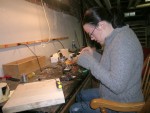Like so many Harvard undergraduates, when Jennifer L. Levye ’11 arrived at Harvard almost four years ago, she was initially set on being pre-med. But her longtime interest in the environment lingered, and after discovering the Harvard Forest Research Experience for Undergraduates (REU) program later that year, she became interested in gaining research experience through the ecology program.
Through independent research, which results in a final presentation, the 20 to 35 students in the Harvard Forest program gain skills and scientific knowledge and are supported by a network of mentors and their fellow students, resulting in what many say is a life-changing experience.
“I started out pre-med. After Harvard Forest, I realized I liked trees more than I liked studying people,” Levye says.
FOREST ROOTS
In 1998, Harvard Forest became part of the Long Term Ecological Research Network, a group of 26 research sites that share data and receives its funding from the National Science Foundation.
“Being a part of the network gives us funding, infrastructure, and community. We also get to have projects that run for multiple decades,” says Clarisse M. Hart, outreach and development manager for education and research programs at Harvard Forest.
Although students have been involved with the Forest since its foundation, David R. Foster, Harvard Forest’s director, started the REU program in 1985. Since then, student researchers have become a cornerstone of the Forest.
CLOSE MENTORING, CLOSE COMMUNITY
Levye was unsure of which project to apply for, so she went to Professor Noel “Missy” Holbrook, who was leading a project, to ask for advice. Ultimately, Holbrook became Levye’s mentor for the summer and for the rest of her college career.
Even students outside of Harvard connect with mentors early on. Relena Ribbons, who attended the program in 2008, is a 2010 graduate of Wellesley College. Her project involved studying the effects of insect infestation on hemlock forests in Connecticut.
“After I decided to apply I was already in contact with my advisor, [David A. Orwig]. Making that contact was important,” Ribbons says.
The REU program includes other events outside of research such as weekly seminars, field trips, and workshops.
“I was kind of expecting to go into the program and be spending a lot of time by myself working on my project, but I had a lot of time to interact with the other students,” Ribbons says.
“It’s like a summer camp for almost-grown-ups,” says David Diaz ’06, who first participated in the program in 2003.
ACADEMIC AWAKENINGS
Diaz, at the time a history concentrator, was looking for a summer opportunity close to Boston. He contacted Aaron M. Ellison, a senior research fellow in ecology at Harvard Forest, and learned about a project that involved identifying and counting ants.
Diaz says, “I’d always been good at science and math, but I never really considered it a career or a study option.”
Diaz’s experience motivated him to create a special concentration of environmental history. Now he works as a forest carbon associate at Ecosystem Marketplace, an environmental non-profit in Washington, D.C.
Ribbons is pursuing a Master of Science in forest resources at the University of Massachusetts Amherst. “Harvard Forest was a good academic awakening, and after that I was a super-charged battery, ready to go,” Ribbons says. “After the REU program, I knew I was going to grad school.”
Alumni say the REU program was one of their best college experiences. Alumni also say that they have continued to benefit from the connections they made during the program.
“It’s not that often coming into your profession that you have a lot of connections,” Diaz says. “It’s very nice to have a network.”
This article was condensed by Clarisse Hart, Outreach & Development Manager for Education & Research Programs, Harvard Forest LTER, from an original article of the same title written by Kerry M. Flynn in The Harvard Crimson (www.thecrimson.com/article/2010/12/6/students-forest-harvard-program).

 Enlarge this image
Enlarge this image
